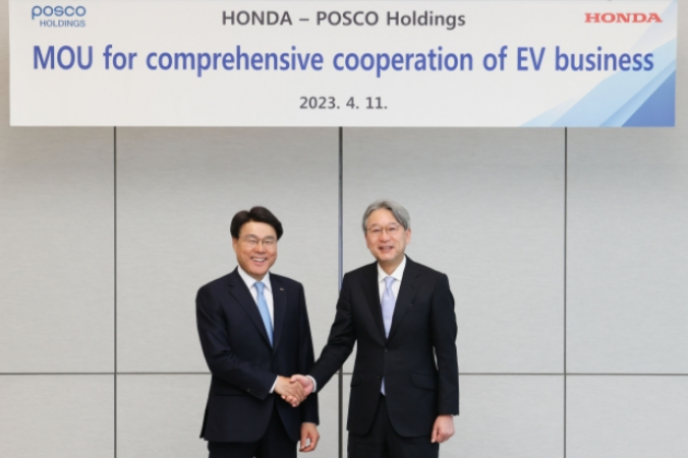POSCO, Honda to cooperate in EV material business
The partnership will cover all areas from eco-friendly steel to cathode materials
By Apr 12, 2023 (Gmt+09:00)
LG Chem to sell water filter business to Glenwood PE for $692 million


KT&G eyes overseas M&A after rejecting activist fund's offer


Kyobo Life poised to buy Japan’s SBI Group-owned savings bank


StockX in merger talks with Naver’s online reseller Kream


Meritz backs half of ex-manager’s $210 mn hedge fund



South Korea's POSCO Group and Japan's Honda Motor signed a comprehensive memorandum of understanding (MOU) on Tuesday to expand cooperation in the electric vehicle (EV) industry. Chairman Choi Jeong-woo of POSCO Group and President Toshihiro Mibe of Honda attended the signing ceremony at the POSCO Center in Seoul.
The partnership aims to extend beyond the existing steel sector to encompass the secondary battery material sector and other areas related to EV, including eco-friendly car plates, anode and cathode materials, solid-state battery materials and recycling initiatives.
Initially, the two companies plan to explore the supply of anode and cathode materials in the secondary battery material sector. Joint technology development for solid-state battery materials will be pursued through periodic business and technology exchanges. They also seek to establish a connection between Honda's EV business and POSCO Group's global recycling operations.
In the steel sector, discussions will revolve around eco-friendly steel for carbon neutrality, expanding motor core sheets for EVs, and non-oriented electrical steel sheets for motors, surpassing the current supply of automobile plates.
To facilitate these efforts, POSCO and Honda will establish sector-specific working groups and engage in long-term cooperation and regular exchange meetings for steel and secondary battery material businesses to expand overseas. A joint response system to address global EV supply chain challenges, such as the US Inflation Reduction Act (IRA) and the EU Critical Raw Materials Act (CRMA), may also be developed.
Market forecasts anticipate global EV demand to surge from about 13.57 million units this year to around 22.36 million units in 2025 and 59 million units in 2030. In response to increasing carbon regulations worldwide, securing an eco-friendly steel and secondary battery material supply chain is crucial for competitiveness in the EV era.
"Honda and POSCO Group are expanding their existing partnership in the steel sector to the secondary battery material sector," Chairman Choi stated. He added that the collaboration would generate a win-win situation for POSCO Group's full value chain strategy for secondary battery materials and Honda's EV expansion strategy.
Honda's President Mibe emphasized the company's commitment to achieving carbon neutrality for all product categories by 2050. He noted that the expanded partnership with POSCO Group, with expertise in secondary battery materials, recycling, automobile plates, non-oriented electrical steel sheets and EV components, will help them reach this goal.
Write to Jae-Fu Kim at hu@hankyung.com
-

-
 Carbon neutralityPOSCO pursues future energy cooperation with Malaysia's Petronas
Carbon neutralityPOSCO pursues future energy cooperation with Malaysia's PetronasApr 03, 2023 (Gmt+09:00)
1 Min read -
 Chemical IndustryPOSCO Int'l expands into bioplastic recycling business
Chemical IndustryPOSCO Int'l expands into bioplastic recycling businessMar 29, 2023 (Gmt+09:00)
2 Min read -
 BatteriesLG Energy, Honda to build $4.4 billion battery plant in Ohio
BatteriesLG Energy, Honda to build $4.4 billion battery plant in OhioJan 13, 2023 (Gmt+09:00)
2 Min read -

-
 Electric vehiclesLG Energy, Honda to form JV for EV battery production in the US
Electric vehiclesLG Energy, Honda to form JV for EV battery production in the USAug 29, 2022 (Gmt+09:00)
1 Min read


